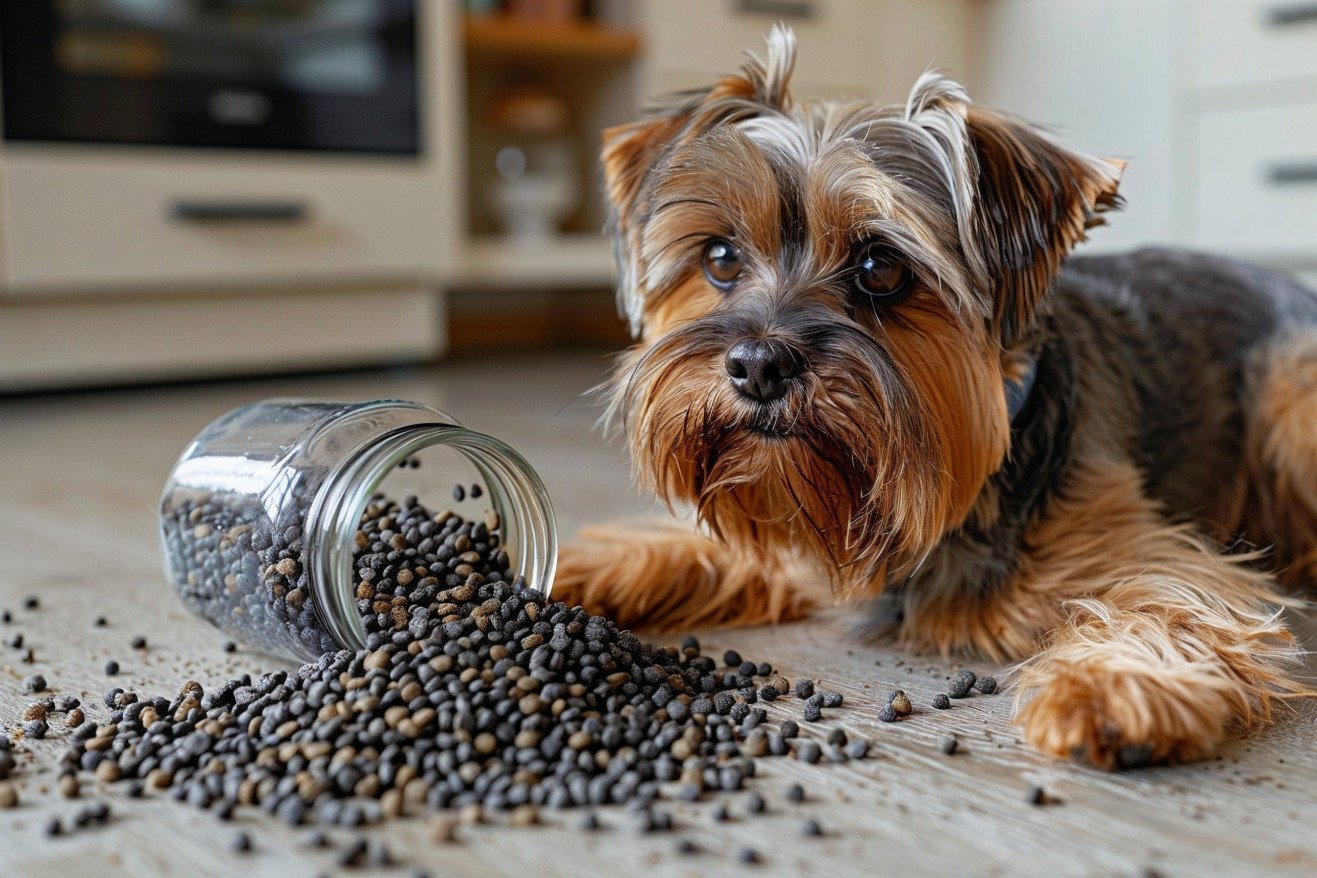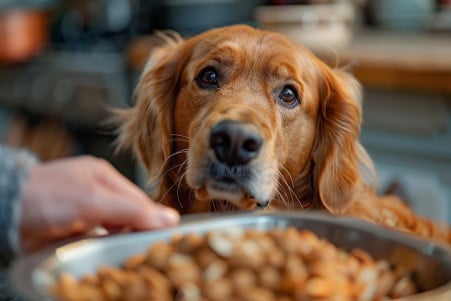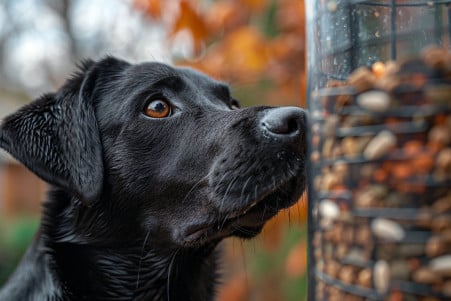Can Dogs Eat Poppy Seeds? Understanding the Risks
12 March 2024 • Updated 12 March 2024

Poppy seeds add a delightful crunch to our favorite foods, but can our furry friends enjoy them too? The short answer is no, dogs cannot eat poppy seeds, as they are poisonous to dogs. If a dog eats poppy seeds, they can suffer from a range of symptoms including loss of appetite, pinpoint pupils, tremors, weakness, and sedation, all of which can lead to death, especially in smaller breeds.
It is important to seek immediate veterinary care if you suspect your dog has ingested poppy seeds.
This article will use information from veterinarians and toxicology studies to outline the dangers of poppy seed consumption in dogs. It will also discuss the pharmacological properties of the toxins in poppy seeds and compare them to general dietary recommendations for dogs. The goal of this article is to give dog owners the information they need to keep their pets safe and know what to do if their dog accidentally eats poppy seeds.
Can dogs eat poppy seeds?
Why Poppy Seeds Are Dangerous for Dogs
Although poppy seeds may not seem like a big deal, they contain chemicals that can be very dangerous for dogs. Alkaloids such as morphine and codeine are found in the seeds of the poppy plant and can cause central nervous system depression in dogs.
As explained by Spoiled Hounds, this can result in a number of symptoms, including loss of appetite and constricted pupils, to more serious issues like ataxia, coma, and death. These symptoms are a sign of poppy seed poisoning, which is a medical emergency.
The alkaloids have a number of different effects on a dog’s body. They can change the way the brain works, leading to sedation or excitement, and they can also affect the heart and lungs. The article on Spoiled Hounds notes that the poppy seed heads, which have a higher concentration of seeds, are especially dangerous.
Because dogs come in so many different sizes and breeds, even a small amount of poppy seeds can be dangerous. Smaller dogs are particularly at risk because their smaller body mass means that even a small amount of ingested seeds can lead to a toxic level.
This is why it’s so important for dog owners to be aware of the symptoms of poppy seed poisoning and to prevent their dogs from coming into contact with the seeds.
What to Do If Your Dog Has Eaten Poppy Seeds
Veterinarians need to take immediate action to help dogs that have ingested poppy seeds. The Merck Veterinary Manual explains that one of the first steps in treatment is to induce vomiting to remove the poppy seeds from the stomach. This is often followed by activated charcoal, which can absorb the toxic alkaloids and stop them from being absorbed into the dog’s system.
Supportive care is also a critical part of the treatment plan for dogs that have ingested poppy seeds. This can include IV fluids to help with hydration and kidney function, monitoring of vital signs, and oxygen therapy if the dog is experiencing respiratory depression.
In addition, Wag Walking notes that treatment plans can also include medications to help with cardiac and behavioral issues, as well as ensuring that the dog is in a calm and stress-free environment.
The prognosis for dogs that have ingested poppy seeds is largely dependent on how quickly they receive treatment. One study published in PubMed found that recovery times varied, with one dog recovering in a day and another taking one to two weeks to recover, which underscores the importance of getting the dog to the vet as soon as possible.
However, if the dog is treated promptly and appropriately, the prognosis for poppy seed poisoning is good and they can go on to make a full recovery.
Looking at the Bigger Picture of Canine Food Toxicities
While poppy seeds can be dangerous for dogs, they are far from the only human food that can be toxic to our furry friends. For example, avocados contain persin, which is harmless to people but can cause vomiting and diarrhea in dogs, according to the ASPCA.
Meanwhile, compounds like methylxanthines in chocolate and caffeine can cause more serious problems, including heart issues and seizures. Even a small amount of grapes or raisins can cause sudden kidney failure in dogs, according to GoodRx, showing that there are many different human foods that can be toxic to pets.
Many of these food toxicities are due to metabolic differences between humans and dogs that cause substances that are safe for people to be metabolized in a way that is toxic for dogs.
However, we can help protect our pets by being aware and taking a proactive approach. This includes learning about the potential risks and following the guidelines for a healthy dog diet, which means avoiding toxic foods like garlic, onions, and products containing xylitol, according to WebMD.
We can also help keep our dogs safe by understanding the different ways that certain foods can affect their bodies and making sure they follow a healthy diet.
How Poppy Alkaloids Affect Dogs
Poppy seeds contain a variety of alkaloids, including morphine and codeine, that are toxic to dogs. One study published in the Journal of Pharmacology and Experimental Therapeutics found that morphine caused a significant increase in the muscular contractions of the dog’s small intestine, which resulted in the disruption of the dog’s gastrointestinal tract.
These alkaloids are also known to affect the central nervous system by binding to opioid receptors, which results in symptoms like sedation, respiratory depression, and gastrointestinal stasis.
The metabolism of these alkaloids in dogs is also problematic. According to reports from PMC, dogs absorb morphine from the gastrointestinal tract, where it is then extensively metabolized in the liver and gut. Meanwhile, codeine is metabolized in the liver to morphine, which increases the alkaloid’s potency in dogs and, as a result, increases the potential for toxicity.
While the long-term effects of these alkaloids on dogs have not been well-studied, another PMC article that looked at the pharmacology of opium alkaloids suggested that the action of opioids on neural cell membranes could mean that chronic exposure to these substances could lead to neurological and behavioral effects.
It’s important to know how different substances affect our pets to keep them safe, and by understanding the toxic effects of poppy alkaloids, dog owners can take steps to prevent their pets from being exposed to these substances and keep them safe.
How to Protect Your Dog from Toxic Foods
One of the most important parts of keeping a dog-friendly home is staying ahead of potential hazards. In order to keep dogs safe from poppy seeds and other toxic foods, dog owners should follow the advice of the Pet Poison Helpline and be mindful of what foods are within their dog’s reach. This requires knowledge, which starts with learning about the dangers of certain foods to dogs.
As Hepper explains, even small amounts of poppy seeds can be dangerous, so it’s important for dog owners to be vigilant about reading food labels. If they’re not sure if a food contains poppy seeds, they should avoid giving it to their dog and make sure it’s not accessible to them.
This also means keeping an eye out for any food that may have fallen on the floor or other surfaces where dogs may be able to get to it.
Dog owners can also protect their dogs by keeping food in secure cabinets or in places that are too high for dogs to reach with their noses.
Fi Team also notes that dog owners should make sure that they don’t have poppies or other toxic plants in their gardens or that their dogs can’t get to them. By taking these precautions, dog owners can minimize the chances of their dogs ingesting something dangerous and keep their pets safe and healthy.
Conclusion: Dogs and Poppy Seeds
In this article, we have covered the many dangers that poppy seeds can present to dogs. From the information we have gathered, we know that poppy seeds contain alkaloids that can impact a dog’s central nervous system, which can lead to symptoms that include a loss of appetite and even respiratory depression, which can be fatal.
It is evident that even a small amount of poppy seeds can cause a lot of damage, especially to smaller dogs.
It is up to us as pet owners to make sure that we are doing everything in our power to keep our dogs away from harmful substances like poppy seeds. This means making sure that we are keeping these items out of their reach and also paying close attention to the foods that we are eating.
If an accidental ingestion does occur, it is important to remember that getting to the vet as soon as possible is the best way to ensure that your dog makes a full recovery and doesn’t suffer from a tragic fate.
In conclusion, it’s important to remember that there are resources like the Pet Poison Helpline that are available to help in these situations. By making sure that we are staying informed and staying on top of these situations, we can make sure that our dogs are safe and healthy.
Let’s use this information to make sure that we are creating a safe space for our dogs where the benefits of having a pet aren’t outweighed by the risks.


